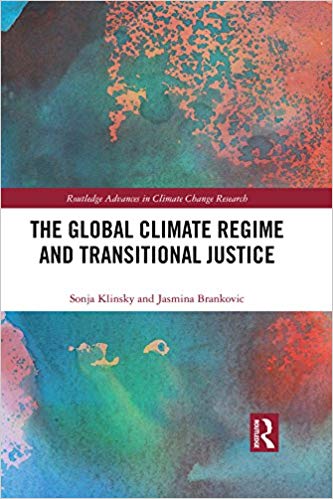Geopolitical changes combined with the increasing urgency of ambitious climate action have re-opened debates about justice and international climate policy. Mechanisms and insights from transitional justice have been used in over thirty countries across a range of conflicts at the interface of historical responsibility and imperatives for collective futures. However, lessons from transitional justice theory and practice have not been systematically explored in the climate context. The comparison gives rise to new ideas and strategies that help address climate change dilemmas.
This book examines the potential of transitional justice insights to inform global climate governance. It lays out core structural similarities between current global climate governance tensions and transitional justice contexts. It explores how transitional justice approaches and mechanisms could be productively applied in the climate change context. These include responsibility mechanisms such as amnesties, legal accountability measures, and truth commissions, as well as reparations and institutional reform. The book then steps beyond reformist transitional justice practice to consider more transformative approaches, and uses this to explore a wider set of possibilities for the climate context.
Each chapter presents one or more concrete proposals arrived at by using ideas from transitional justice and applying them to the justice tensions central to the global climate context. By combining these two fields the book provides a new framework through which to understand the challenges of addressing harms and strengthening collective climate action. This book will be of great interest to scholars and practitioners of climate change and transitional justice.
چکیده فارسی
تغییرات ژئوپلیتیک همراه با فوریت فزاینده اقدام جاه طلبانه اقلیمی، بحث های مربوط به عدالت و سیاست بین المللی آب و هوا را دوباره باز کرده است. مکانیسمها و بینشهای عدالت انتقالی در بیش از سی کشور در طیفی از درگیریها در رابط مسئولیت تاریخی و الزامات آینده جمعی استفاده شده است. با این حال، درس هایی از نظریه و عمل عدالت انتقالی به طور سیستماتیک در زمینه آب و هوا مورد بررسی قرار نگرفته است. این مقایسه باعث ایجاد ایدهها و استراتژیهای جدیدی میشود که به رفع معضلات تغییرات آب و هوایی کمک میکند.
این کتاب پتانسیل بینشهای عدالت انتقالی را برای اطلاعرسانی به حاکمیت آب و هوای جهانی بررسی میکند. این شباهتهای ساختاری اصلی بین تنشهای فعلی حاکمیت آب و هوای جهانی و زمینههای عدالت انتقالی را نشان میدهد. این بررسی میکند که چگونه رویکردها و مکانیسمهای عدالت انتقالی میتوانند به طور مؤثر در زمینه تغییرات آب و هوا اعمال شوند. اینها شامل سازوکارهای مسئولیتی مانند عفو، اقدامات پاسخگویی قانونی، و کمیسیون های حقیقت، و همچنین غرامت و اصلاحات نهادی است. سپس کتاب فراتر از رویههای عدالت انتقالی اصلاحطلب است و رویکردهای دگرگونکنندهتری را در نظر میگیرد و از آن برای بررسی مجموعه گستردهتری از احتمالات برای زمینه آب و هوا استفاده میکند.
هر فصل یک یا چند پیشنهاد مشخص را ارائه میکند که با استفاده از ایدههایی از عدالت انتقالی و بکارگیری آنها در تنشهای عدالت محوری در زمینه آب و هوای جهانی به دست آمده است. با ترکیب این دو زمینه، کتاب چارچوب جدیدی را ارائه میکند که از طریق آن میتوان چالشهای پرداختن به آسیبها و تقویت اقدام جمعی آب و هوا را درک کرد. این کتاب برای محققان و دست اندرکاران تغییرات آب و هوایی و عدالت انتقالی بسیار جالب خواهد بود.
ادامه ...
بستن ...
Ebook details:
عنوان: The Global Climate Regime and Transitional Justice (Routledge Advances in Climate Change Research)
نویسنده: Sonja Klinsky, Jasmina Brankovic
ناشر: Routledge; 1 edition (April 9, 2018)
زبان: English
شابک: 0415786029, 978-0415786027
حجم: 2 Mb
فرمت: True Pdf
ادامه ...
بستن ...










